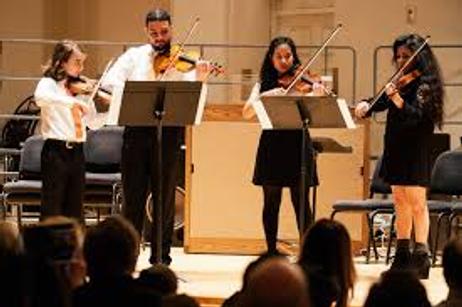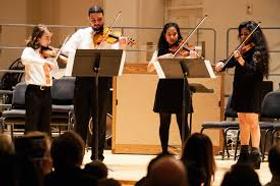While a wide array of community colleges across the country offer traditional music programs in musical practice, theory, and study, many new community college programs are offering more unique and specialized musical education courses. Today, students can enroll in programs to study historically-informed instruments, or they can even enroll in courses that teach students how to become employed in the field of music management and production.
Edmonds Community College offers a thorough and diverse array of music-oriented courses. Together, the Music Department of ECC established clear instruction goals, which include: “Giving students a solid foundation all facets of music, providing a range of performance and creative opportunities, offering diverse music theory and digital music courses, creating a dynamic, rich learning environment for students to pursue their passion for music and performing.”
To guide students towards achieving and engaging in these goals, ECC provides a variety of performance opportunities and events. Most notably, ECC fosters positive programs for musical enrichment through organizations such as the symphonic choir, the jazz band and choir, and the jazz workshop. These groups, along with many others, serve to enhance student learning and performance experiences.
Adding to these support systems, ECC’s Music Department also provides students with specialized acoustic fixtures in their music classrooms, various practice pianos and state of the art recording gear, in addition to ECC’s state of the art recording studio with a digital interface that students can interact with through hands-on opportunities.
Virginia Highlands Community College
While many community college students crave to learn more about the digital evolution of music and music production, Virginia Highlands has simultaneously fostered a program to celebrate the roots and heritage of music.
At VHCC, students can enroll in “old-time” music studies, where classes have been specifically designed to educate students on the once-popular use of instruments, such as the Fiddle and Banjo. Designed to preserve the cultural and musical heritage of America, VHCC’s expert instructors have extensive backgrounds and expertise in the studies of music and American musical roots.
For students interested in these courses, individuals can enroll in “Old Time Fiddle for Beginners,” where students will learn the art of “Listening, learning, and playing skills that are the foundation of old-time fiddling.” Or, for a different approach, students can try out “Old Time Claw Hammer Banjo for Beginners,” where students will be introduced to, “tuning, basic right- and left-hand techniques, chords, and simple rhythm and melody playing.” Regardless of experience, the historical music classes at VHCC are designed to teach all interested individuals the art of traditionally valued American music.
This video showcases the Faculty and Staff Talent show at Virginia Highlands Community College.
If students are interested in a more modern focus on their musical education, then Austin Community College’s Commercial Musical Management programs may grab a great deal of attention and focus. Students enrolled in Musical Management courses at ACC can explore specific musical studies through programs such as Audio Engineering, the Music Business, and Commercial Performance. From learning the business elements of music production, to even learning about commercial improvisation methods, ACC’s courses cover an array of topics and focus areas.
New and interested students can perhaps begin with ACC’s “Survey of the Music Business,” where students will learn, “An overview of the music industry including songwriting, live performance, the record industry, music merchandising, contracts and licenses, and career opportunities.” Adding to this, students can also enroll in classes focusing on “Music Publishing,” where students will learn details of copyright law and royalty collections.
This video describes Austin Community College's varied music program offerings.
Moving along through the program options, students can even explore personal interests in the “Special Topics: Student-Initiated Project” course. Here, students will “Apply the skills learned in other Commercial Music courses. Topics address recently identified current events, skills, knowledge, and/or attitudes and behaviors pertinent to the technology or occupation and relevant to the professional development of the student. Advanced work in areas of special interest with the approval of the instructor.” By exploring personal topics of interest, students may be able to deepen their knowledge of musical studies in order to more thoroughly and independently prepare for their career in the music industry.
Adding to this experience, students are also encouraged to enroll in the “Internship” classes, where students can gain real-world lessons by interacting and participating in the fields and sites of music production and employment.
Questions? Contact us on Facebook. @communitycollegereview












